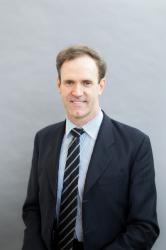To say that the history of Latin America in the twentieth and twenty-first centuries is marked by sadness and disappointment is hardly a novel insight. Whether it’s the persistence of cronyism throughout the region, the constant presence of Marxist ideology among intellectuals and in popular culture, the challenge of poverty, the crime and political violence, or the rampant populism that rears its head at regular intervals, many Latin Americans will tell you that theirs is the continent in which many things went backwards throughout the twentieth century.
There are, however, always signs of hope. And one of those is the Universidad Francisco Marroquín, based in Guatemala City in Guatemala. I’ve been fortunate to visit and lecture at UFM on several occasions. I can say that I haven’t encountered many other colleges or universities in which there has been such a commitment to freedom, truth and the search for what is right. In that sense, UFM lives up to its motto: Veritas. Libertas. Iustitia.
A secular and private university named after the first bishop of Guatemala, Francisco Marroquín, UFM is a place where there is a strong emphasis on free market economics as well as the political and philosophical principles which form the foundation of a free and just society. Above all, UFM insists that a free society can only be based on free and responsible persons. That requires formation in character and virtues.
This is where religion comes into the picture. Guatemala is one of the most religious observant societies in the world. The population is more or less split evenly between various Protestant confessions and Catholicism. There is also a small and active Jewish community. Only 10 percent of the population is religiously unaffiliated.
This sociological reality is one reason why, despite its secular foundation, UFM has always taken religion seriously. But many UFM professors from all disciplines also engage religious questions and their place in free societies because they recognize that the question of religion ultimately comes down to the question of truth.
While always respecting and affirming UFM’s secular character, you quickly discover that UFM faculty and students have no reservations talking about and rigorously debating religious questions: far more so, in my experience, than faculty and students in many American universities, including some with a religious foundation.
During a recent visit to UFM, for example, I gave seminars on topics ranging from religion and capitalism to the relationship between church and state. Around the table on these occasions were Evangelicals, Catholics, agnostics, and atheists. But the discussion of these complicated and often controversial subjects was respectful and rigorous. Who can ask for more?
One institution that has helped to further this engagement between the worlds of liberty and religion in Guatemala is the Instituto Fe y Libertad. An independent organization founded by UFM faculty, students, supporters, and others from a variety of confessional backgrounds, Fe y Libertad works with UFM faculties and centers as well as other educational groups, business leaders, clergy, and journalists throughout Guatemala to further the discussion of faith and freedom.
As well as providing groups ranging from rural Evangelical pastors to urban Catholic priests with what is often their first ever exposure to basic economic principles, Fe y Libertad engages in activities ranging from producing a referred academic journal to making media presentations on how to tackle poverty through entrepreneurship and trade in settings that, I suspect, most of us who live in the United States would find heartbreaking.
So if any readers are heading to Guatemala in the near future—whether it is for mission work, a desire to taste some of the best coffee in the world, or to visit the beautiful colonial city of Antigua—make some time to visit UFM and the dedicated people at Fe y Libertad. I can assure you that you will not only be welcome. You will impressed beyond all expectation.

